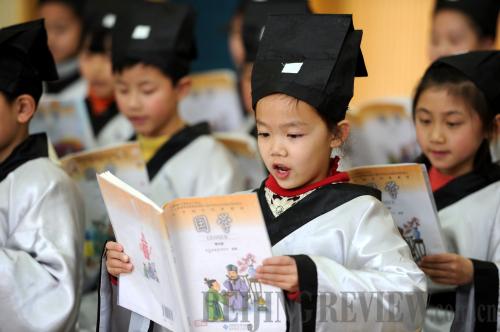|
 |
|
PHILOSOPHICAL CLASSIC: Students read the Analects of Confucius at Xiyou Primary School in Hefei, Anhui Province, on February 21, which was International Mother Language Day. The special day was established in 2000 to promote linguistic and cultural diversity and multilingualism (LIU JUNXI) |
Geographic Data
China plans to offer basic geographic information at low costs or even for free in the future so as to boost the development of the geomatics industry, said the national geoinformation authority on February 24.
Geomatics is a relatively new scientific term that refers to the discipline of gathering, storing, processing, and delivering geographic information.
The policy will offer support to companies and promote their value-added development based on this data, according to the National Administration of Surveying, Mapping and Geoinformation at a meeting.
The government also plans to invest more in purchasing services from social sectors, take measures to encourage companies to compete internationally, boost growth in consumption of geographic information, and invigorate private investment in the sector, according to the administration.
It is estimated that the annual total output value of China's geomatics industry reached 260 billion yuan ($42.5 billion) in 2013, up 30 percent from 2012, figures from the Ministry of Land and Resources show.
International Students
About 413,900 Chinese students went abroad to study in 2013, with 353,500 returning, up 3.58 percent and 29.53 percent respectively, the Ministry of Education revealed on February 22.
According to the ministry, in the last 35 years, more than 3 million people have furthered their studies in foreign countries.
With a growing number studying abroad, more overseas students are also coming to China, and the quality of education is improving.
In 2013, 356,500 people from more than 200 countries and regions worldwide attended courses at 746 universities, scientific research institutions and other educational institutes across China.
Drinkable Water
Some 680,000 rural residents in northwest China's Xinjiang Uygur Autonomous Region will have access to safe drinking water by the end of this year, according to the regional government.
The central authorities and regional government will invest 500 million yuan ($82 million) in 2014 to make it happen, Xinjiang's Rural Work Office revealed on February 25.
Xinjiang has been striving to provide more residents, especially those living in rural and pastoral areas, access to tap water since 2010.
By the end of 2013, 10.65 million Xinjiang residents in rural and pastoral areas had access to drinking water that meets safety standards, according to the office.
The government said that 86 counties across the region have drafted plans on building their water quality monitoring network. Sixty-five county-level laboratories that will carry out water quality tests have been set up. | 